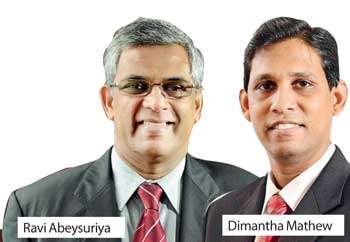19 Apr 2018 - {{hitsCtrl.values.hits}}
 The weak link between the Colombo Stock Exchange (CSE) and global market trends is keeping earnings growth of the CSE indices below growth rates of competing markets.
The weak link between the Colombo Stock Exchange (CSE) and global market trends is keeping earnings growth of the CSE indices below growth rates of competing markets.
A latest regional World Bank report indicated the correlation between global trends and stock market developments in Pakistan and Sri Lanka are weaker compared to other regional peers such as India and Bangladesh.
The CSE’s main indices only recorded single-digit growths in 2017, against the double-digital growths across the global markets.
The CSE’s S&P SL Index, comprising the top 20 blue-chip companies, only recorded a gain of 4.93 percent in 2017, while the All Share Price Index (ASPI) gained 2.39 percent, which were well below the performance of global markets such as India’s BSE Sensex, which gained 29.58 percent and NSE Nifty that recorded a gain of 30.28 percent.
Similarly, Hong Kong’s HIS gained 41 percent, the United States’ DOW 30.28 percent, the Philippine’s Pcomp 27.15 percent and Brazil’s IBOV 28.6 percent in 2017.
Speaking to Mirror Business, First Capital Holdings Research Head Dimantha Mathew said the CSE needs to plug itself into global markets in order to achieve high growth in earnings as Sri Lanka’s capital market is small compared to most of the global markets.
He added that being connected to global trends is a factor the foreign investors view positively, despite increased volatility.
Stock market analysts opine that lack of political will in capital market reforms, inactivity of institutional investors and absence of external sector listed companies in the CSE were major factors for the weak link.
Candor Group Director Ravi Abeysuriya said the prime reason for the weak link was the inactivity of institutional players in the market, which includes both state and private institutional investors.
According to both Mathew and Abeysuriya, the state institutions, which make up the majority of institutional investors in the CSE, have been virtually non-existent over the last three to four years, which had adversely impacted the market sentiment and the confidence of private institutional investors.
“There has been a significant slowdown of trading activities of local institutions—mainly government-related institutions. The EPF, Sri Lanka Insurance and NSB were virtually non-existent in the market, that’s why the activity died off in the market in terms of trading,” said Mathew.
Abeysuriya emphasized that Sri Lanka’s failure to attract local investors to the market was influenced by political issues and lack of political will to drive capital market reforms.
“Never-ending investigation on stock market manipulations and other complaints have been dragging on for years without a judgment and are adversely impacting the investor confidence and sentiment,” Abeysuriya said.
Mathew said the CSE remains to be an attractive market for foreign investors due to cheap valuations, which are at the 10-11 times of the P/E ratio at the moment. However, he added that low valuations are holding off the large export-oriented companies such as Brandix and MAS from entering into the stock market.
He said that Sri Lanka’s record high foreign inflows to the CSE last year was due to “extremely low” valuations and positive sentiment of global investors on the South Asian region.
Mathew noted that Sri Lanka’s recent successful sovereign bond issue of US $ 2.5 billion will positively impact the foreign investor participation in the CSE in coming months. However, he raised concerns over the delay in the government’s reform agenda, which is likely to impact the foreign investor sentiment.
Meanwhile, Abeysuriya noted that the delays over implementing the proposed new Securities Exchange Act could result in the country losing US $ 250 million loan committed by the Asian Development Bank to implement the Capital Market Development Programme (CMDP) in Sri Lanka. (NF)
18 Nov 2024 2 hours ago
18 Nov 2024 3 hours ago
18 Nov 2024 3 hours ago
18 Nov 2024 4 hours ago
18 Nov 2024 8 hours ago